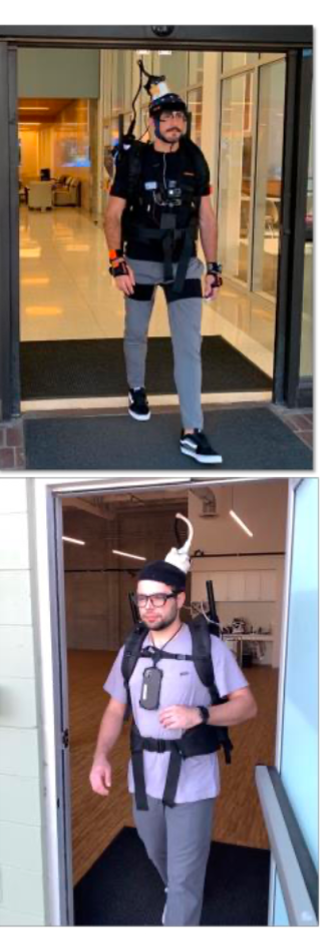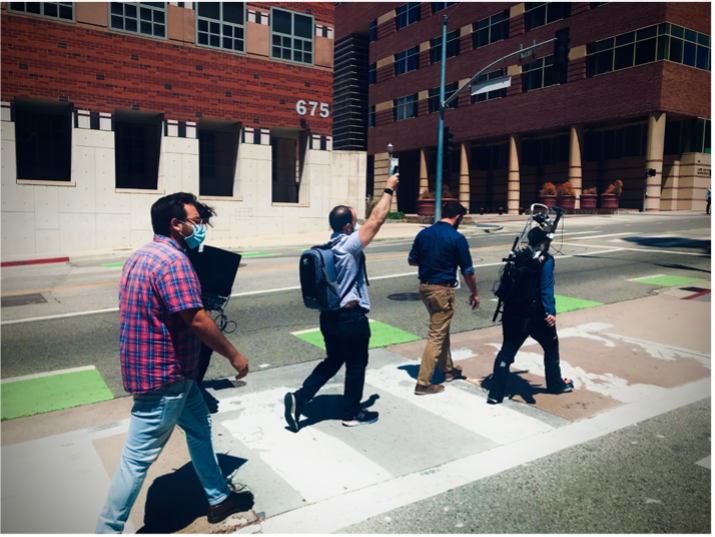Faculty Feature
Dr. Cory Inman, Assistant Professor of Psychology,
Receives NIH BRAIN Initiative Grant
 We are thrilled to congratulate Assistant Professor of Psychology, Dr. Cory Inman,
for receiving a significant grant from the National Institute of Health (NIH) as part
of the BRAIN Initiative. Dr. Inman's project, titled "Capturing Autobiographical Memory
Formation in People Moving Through Real-World Spaces Using Synchronized Wearables
and Intracranial Recordings of EEG," has been recognized for its innovative approach
and potential impact on understanding cognitive and neural processes related to memory
formation.
We are thrilled to congratulate Assistant Professor of Psychology, Dr. Cory Inman,
for receiving a significant grant from the National Institute of Health (NIH) as part
of the BRAIN Initiative. Dr. Inman's project, titled "Capturing Autobiographical Memory
Formation in People Moving Through Real-World Spaces Using Synchronized Wearables
and Intracranial Recordings of EEG," has been recognized for its innovative approach
and potential impact on understanding cognitive and neural processes related to memory
formation.
The grant, known as the Brain Behavior Quantification and Synchronization (BBQS) CAPTURE grant, is a testament to Dr. Inman's dedication, expertise, and pioneering research in neuroscience. As the Principal Investigator of this grant, Dr. Inman will lead a groundbreaking study funded in two phases. The first phase involves developing a novel multimodal recording application, while the second phase focuses on studying real-world memory synchronized with direct neural recordings in humans.
 Dr. Inman's project aims to unlock the potential of combining wearable mobile recording
devices with precisely synchronized intracranial neural recordings during real-world
behaviors. This approach is crucial for studying autobiographical memory (AM) formation,
a complex human behavior involving attention, decision-making, emotion, episodic memory,
social interactions, and navigation.
Dr. Inman's project aims to unlock the potential of combining wearable mobile recording
devices with precisely synchronized intracranial neural recordings during real-world
behaviors. This approach is crucial for studying autobiographical memory (AM) formation,
a complex human behavior involving attention, decision-making, emotion, episodic memory,
social interactions, and navigation.
AMs are deeply personal and detailed memories of one's life experiences, making them challenging to study with traditional neuroimaging methods. Dr. Inman's research seeks to bridge this gap by capturing the neural correlates of AM encoding as it happens, offering new insights into cognitive and neural processes relevant to neurological disorders like Alzheimer’s disease.
The proposed project is not only innovative but also addresses critical needs in understanding memory-related behaviors in complex real-world settings. By developing technical, methodological, and computational approaches, Dr. Inman's work paves the way for reliable treatments aimed at enhancing memory and cognition in daily life.
 Furthermore, the project's potential impact extends to developing neuromodulation
approaches that could one day restore real-world memory for individuals affected by
memory disorders. Dr. Inman's collaboration with over 60 potential research participants
with implanted sensing and stimulation devices at the University of Utah underscores
the translational nature and clinical relevance of this research. This project will
also enable the synchronization of real-world behaviors with a variety of non-invasive
brain-recording techniques, like scalp electroencephalogram (EEG) and functional near-infrared
spectroscopy (fNIRS).
Furthermore, the project's potential impact extends to developing neuromodulation
approaches that could one day restore real-world memory for individuals affected by
memory disorders. Dr. Inman's collaboration with over 60 potential research participants
with implanted sensing and stimulation devices at the University of Utah underscores
the translational nature and clinical relevance of this research. This project will
also enable the synchronization of real-world behaviors with a variety of non-invasive
brain-recording techniques, like scalp electroencephalogram (EEG) and functional near-infrared
spectroscopy (fNIRS).
We extend our congratulations to Assistant Professor Cory Inman for receiving this prestigious NIH grant. His dedication to advancing neuroscience and improving our understanding of memory processes in real-world contexts holds promise for future breakthroughs in memory-related research and treatments.
About the Blog
Discussion channel for insightful chat about our events, news, and activities.
